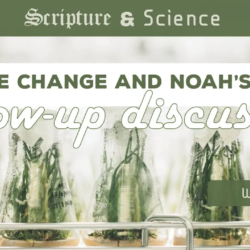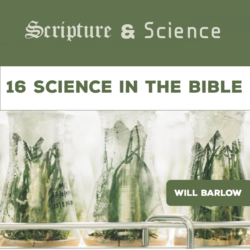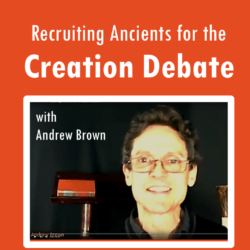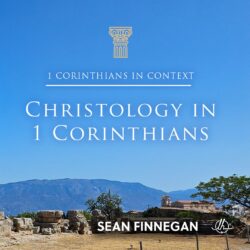We’ve been considering the various options for interpreting the creation account in Genesis. Last time we looked at two young earth theories and today we’ll survey three old earth perspectives, including the day age theory, modified day-age theory, and a non-literal approach. For each Will Barlow explains the basics and offers a gentle critique.
Listen to this episode on Spotify or Apple Podcasts
See below for notes.
—— Links ——
- We are doing follow-up discussions to these episodes on YouTube. Check them out!
- See other episodes in this Scripture and Science Class
- Check out Barlow’s previous podcast episodes
- Learn more about and support the church Barlow and his team are starting in Louisville, KY, called Compass Christian Church
- Find more articles and audios by Barlow on his website: Study Driven Faith
- Check out the early Christian quotes about the Hebrew version of the Gospel of Matthew here
- Support Restitutio by donating here
- Designate Restitutio as your charity of choice for Amazon purchases
- Join our Restitutio Facebook Group and follow Sean Finnegan on Twitter @RestitutioSF
- Leave a voice message via SpeakPipe with questions or comments and we may play them out on the air
- Intro music: Good Vibes by MBB Attribution-ShareAlike 3.0 Unported (CC BY-SA 3.0) Free Download / Stream: Music promoted by Audio Library.
- Who is Sean Finnegan? Read his bio here
—— Notes ——
What have we seen so far?
• Genesis was written to a group of ancient people coming out of slavery
• The questions that they were asking of the text are different than the questions that we ask
Many views of Genesis 1
Perhaps the easiest way to divide them is:
• Young-earth views
• Old-earth views
• Views compatible with either
Old-Earth Views
• “Day-Age” and modified “Day-Age”— Hugh Ross, Gerald Schroeder
• “Theistic Evolution” — Francis Collins
• Gap and modified gap — Scofield Bible
• “Day-Age” and modified “Day-Age”— Hugh Ross, Gerald Schroeder
• “Theistic Evolution” — Francis Collins
• Gap and modified gap — Scofield Bible
Day-Age
There are various versions of Day-Age:
• Standard
• Earth-bound perspective (Hugh Ross)
Pros of Standard Day-Age
Here are some pros with the standard formulation of Day-Age:
• Generally, the sequence of events seems like it could be a plausible representation from an ancient person’s perspective of the scientific order of events
• In the Bible, “day” can mean more than one 24-hour period
Examples of Longer “Days”
Genesis 2:4 These are the generations of the heavens and the earth when they were created, in the day that the LORD God made the earth and the heavens.
Genesis 4:3 In the course of time [yom – day] Cain brought to the LORD an offering of the fruit of the ground,
Genesis 44:32 For your servant became a pledge of safety for the boy to my father, saying, ‘If I do not bring him back to you, then I shall bear the blame before my father all my life.’ [literally – “all my days”]
Problems with Standard Day-Age
Here are some problems with the standard formulation of Day-Age:
• The word “day,” when paired with a specific number (and the description of evening and morning), seem to indicate a 24-hour period
• The order in Genesis 1 is not perfect scientifically
Scientific Order vs. Genesis 1
Earth Bound Perspective Day-Age
“The observer’s vantage point is clearly stated: ‘the surface of the deep… over the waters.’ Yet the vast majority of Genesis commentaries mistakenly proceed as if it were still high in the heavens somewhere in the starry realm above Earth.” (pg. 23)
“The problem glares from the page at anyone slightly aware of how nature works. If the storyteller’s viewpoint lies in the starry realm above, plants (created on Day Three) appear before the sun even exists (Day Four).” (pg. 23)
• The Earth Bound Perspective of Day-Age does significantly help the issue dealing with the order of scientific information in comparison with Genesis 1
• However, it does not resolve the issue surrounding the word “day”
Problems with Modified Day-Age
Here are some problems with the modified formulation of Day-Age:
• It still does not solve the problem that the order in Genesis 1 is not perfect scientifically.
• There is no indication in the text anywhere that there should be gaps between each day of creation.
Relativistic Day-Age
“Starting with Day One, the results are, approximately: 7; 3.5; 1.8; 0.9; 0.5; 0.2 billions of years compressed within each successive 24-hour biblical day. This is in close agreement with the NASA number of 13.7 billion years.”
Schroeder on “Day”
“Almost a millennium ago, the biblical commentator Nahmanides realized that there must be a deeper meaning to the words “evening” and “morning.” He taught that the root or implied meaning of the Hebrew word usually translated “evening,” erev, is “mixture,” “chaos.” As the sun sets, he reasoned, vision becomes blurry, mixed. The implied meaning of the word translated “morning,” boker, is just the opposite.
As the sun rises, vision becomes clear, orderly. Individual objects and colors can be discerned. The implied meaning of boker has within it the concept of order. The flow in simple terms is from P.M. to A.M. But the deeper meaning, the far more significant truth, is that six times over, at the conclusion of each day of creation, there was remarkable flow contrary to what is normally observed in unguided nature.
Normally, in all events, order degrades to disorder. That is why leaves decay on the ground and a cup of hot tea becomes cool as it remains on the table. But in this particular part of the universe, the opposite occurred, and the Torah emphasizes this six times over in the subtle language “And there was evening and there was morning.” (pgs. 40-41)
Collins on Genesis 1
Genesis 2 then begins with a description of God resting on the seventh day. After this appears a second description of the creation of humans, this time explicitly referring to Adam. The second creation description is not entirely compatible with the first; in Genesis 1 vegetation appears three days before humans were created, whereas in Genesis 2 it seems that God creates Adam from the dust of the earth before any shrub or plant had yet appeared. (pg. 150)
If a literal description was intended, why then are there two stories that do not entirely mesh with each other?
(pg. 151)
Problems with Collins’ Non-Literal View
Here are some problems with the Non-Literal view:
• It doesn’t attempt to make sense of the text in context. In fact, it uses supposed deficiencies to make a case that we should not take Genesis literally.
• Atheists love to attack this perspective, since it shows that Jews and Christians can “pick and choose.”
outro:







Thanks for the interesting discussion regarding Genesis 1. I have noticed you have not discussed what “science” actually is or any definition of what constitutes a “scientific theory”. This book (https://en.wikipedia.org/wiki/What_Is_This_Thing_Called_Science%3F) has been a great help to me and provides some startling information that Christians should know when trying to position “science” with respect to God. Indeed, as Karl Popper points out, a lot of what we call “science” today is really pseudoscience by definition and knowing this can be very useful in discussions of the scientific theories of biblical creation with Atheists….
Thanks again for the effort you all have put into the podcasts and website etc.
May Yahweh bless and keep you….
Anthony